Buying Your First Boat
- gcgegg91
- Jun 9, 2021
- 7 min read
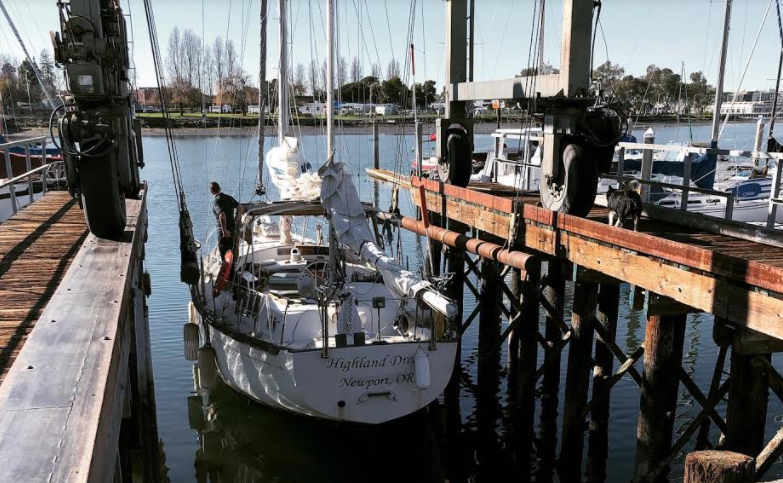
Intro
I will fully admit that I had some trouble trying to think of a first (and compelling) blog to post on this site. I have never done anything like this before, and when I queried google, the amount of returns was both overwhelming and unhelpful. In the end, I settled on writing about the beginning (heh.. see what I did there?)
I spent the better part of my youth sailing in Southern California. Most of my childhood summers were filled up teaching sailing at the Ventura Harbor City Dock or cruising to the Channel Islands. Once summer was over, race season began, and many weekends (and some weekdays) were spent racing the family F31 Corsair around one offshore oil rig or another. I do not think it would be bragging to say I was a damn good sailor. I could jockey in the start of any race with the best of skippers. I even sailed a boat backwards over the finish line one time, winning a yacht club youth regatta. (Badass right?....I certainly thought so).
Fast forward 15 years. I have completed multiple blue water cruises and lived on board a boat for months at a time. I taught myself how to navigate using the sun and could successfully plot courses across oceans. Weekends were spent ripping along the Santa Barbara coastline in my Hobie 16 and life was grand. I was finally at a point where I felt comfortable in my life, finances, and future to pull the trigger on my long time dream of owning and living aboard my own blue water cruiser.
Remember how I spent the last two paragraphs telling you how much experience I had? Turns out I knew a lot about sailing, and very little about boats.
There is a HUGE difference between knowing how to make a sailboat move and how to make a 9,000 lb home/machine that can cross oceans. Once I started digging into the details, I realized just how little I knew about the operation of true blue water cruisers. I distinctly remember one point where I was touring a Robert Perry designed sloop, seeing a small box that looked like R2D2, and thinking ... "WTF is that? What the heck is any of this stuff? Am I in over my head?"
Luckily the thought passed. After many days of crawling all through the insides of boats for sale, I started to connect the dots on what systems were linked to parts of every day life, and how to tell if something worked or just looked like it worked. In the rest of this post, I want to lay out a few points that helped me along the way.
Do Your Research
I can't stress this point enough. Nothing will make you feel better about your current ignorance as becoming educated. When it comes to studying up, there are two areas that I think are important to cover:
a. General information about boat systems.
b. Information specific to the boat you are interested in.
For the first topic, there are plenty of resources online to get you educated. I would highly recommend spending the few extra sheckles to buy books like "Inspecting the Aging Sailboat" by Don Casey or Nigel Calder's "Boatowners Mechanical and Electrical Manual". These books do a great job of breaking systems down to the basics and highlighting what is most critical to a boats basic function. Even now after owning a boat, I regularly go back to these books as a point of reference before starting any major project. The knowledge in these books is probably the single greatest gift you can give yourself... aside from the boat itself of course.
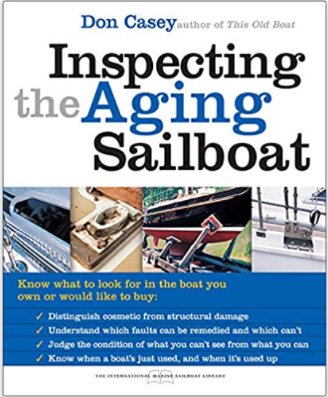
Once you have a good baseline of knowledge from these books, it is key to use that knowledge when looking at any boat you will be trusting your life with one day. Every boat design is unique and no two boats older than a year will be exactly alike (all owners make small changes in their own unique way). Before you go and tour a boat, look online for owner's forums or reviews given by trusted sources like Sail Magazine or Cruising World. These are great places to find out both positive and negative aspects of the boat you will look at. I distinctly remember looking at a 1982 Valiant 40 and thinking "This is it! This is the boat for me!." The boat looked great, was an amazing price, and everything seemed to run, hoist, and flush. The broker mentioned that the boat had previously experienced a small osmotic blister issue, but the previous owner took care of it. I had run into osmotic blisters before and didn't think much of it. However, after only 20 minutes into my research on the Valiant 40, did I learn that boats within certain build years suffered from a very serious blistering issue caused by a flaw in the resin that was used to cast the hull. That "small" blistering issue that the broker mentioned turned out to be a problem that recurred every couple years and cost thousands to fix each time. Luckily, it only took me a quick google search to dodge a very expensive mistake.
2. Take Your Time
There is no rush to buy a boat, and don't let anyone tell you otherwise. Once you educate yourself, it is important to tour as many boats as you can, even if you are pretty certain it is not the boat for you. Reading about boats wont give you the full picture or enough context to understand some of the nuances of sailing vessels and their systems. I think I viewed 7 or 8 boats over the course of 6 months before I made my choice, and that was probably too few. After owning Te Ara for 4 months, I am still learning some of her systems and things that I didn't even think to look at previously. No amount of reading can replace actually being on your potential floating home and getting a sense of the size, systems, and general comfort of the vessel.
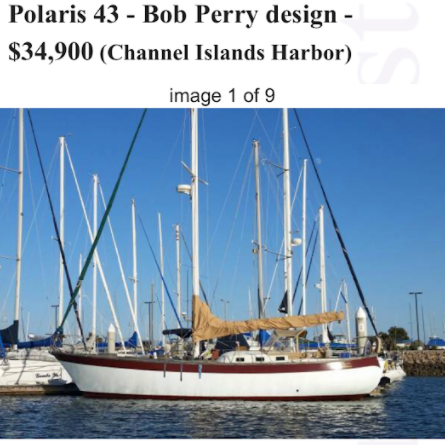
Another note: I preferred working with private owners over brokers. The owners always seemed excited to tell you about the boat and its various gadgets, whereas the brokers seemed to want the quickest sale and often didn't know that much about the boat (but were always eager to tell you about the most recent boat they bought). When buying Te Ara, I was lucky enough to work with Philip Gebhart, the previous owner. He was selling the boat remotely due to COVID but was always available for me to call and ask questions. During the initial viewing, after I expressed interest in proceeding, he allowed me to keep a set of keys to the boat so that I can come browse around at my leisure while we wrote up the sales contracts and other documentation. This would never be allowed by a broker and the extra show of trust and confidence in his vessel gave me a lot of relief that I wasn't buying something that was better used as a barge.
3. Go In With a Plan and List of "Must Haves"
One of the best pieces of advice that I was given (Colin and Wendy Gegg) when buying my boat was this:
Make a list of items that need to be present (and working) for any boat that you will buy, and go into the viewing with an inspection plan/checklist.
Once you get on board, there will be literal hundreds of things to look at and it is easy to get distracted from what is important. It doesn't help if the broker/owner is jabbering away in your ear the whole time about how a Jabsco toilet lasted longer than the Vacuflush on their weekend sailor. Have a list ready of things that you need to inspect and things the boat must have for you to consider buying her. I only started doing this half way through my experience and it made all the difference. Some of the things on my list were:
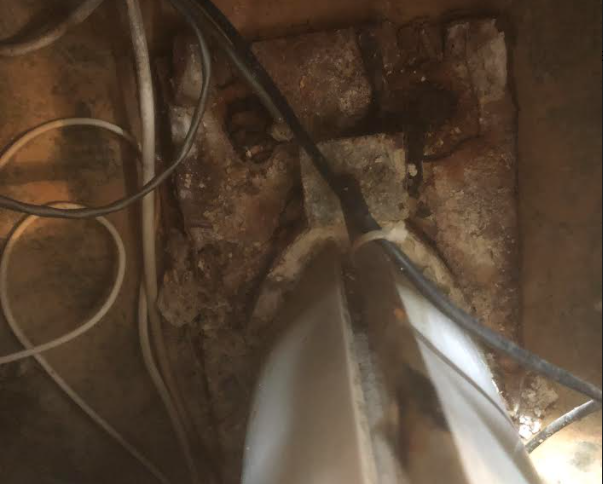
Does the engine start?
Is there a "U" shaped kitchen?
Is there an aft cabin?
Are the sails in workable condition? (What sails does it have?)
Does it have fresh water?
Is there a lot of growth on the bottom and how often is the boat sailed?
Is there water in the bilge and from what?
Does the mast step show damage or aging and are the chain plates secure?
You will continuously develop and tailor these questions based on your research and experience looking at other boats. Your list at the end will look very different from your list at the beginning, and that's ok! Preferences and needs change as understanding and knowledge grow. I found that the list and requirements always helped me to focus my attention and identify both positive and negative aspects of the vessels.
One final note: Don't be afraid to consult the experts! Hire a surveyor and talk with experts at your local chandlery. Although boat surveys can be expensive, they are well worth the price and will identify many things that you missed. Just be sure to do your research on the surveyor before you pay for them. I had two surveyors and a skipper back out on me days before the inspection. Make sure the surveyor is certified and will provide you with a full report after completion of their inspection.
Final Thoughts
I have given a lot of advice here as if I were a pro, but want to assure everyone that I am not. I got plenty of this wrong on many occasions. I dropped my list at the first chance to look at the Valiant 40. At times, I couldn't even find the mast step or the fresh water system. Even on Te Ara, I am finding things that I thought worked and don't (3 of the 4 water tanks didn't fill, thru hulls leaked, fuel transfer pump to the day tank was blown). You WILL miss things. There is just no way to fully review a boat before owning and living on it every day. Be patient with yourself and any vessel you end up purchasing. In my experience after educating myself, everything is pretty simple to fix (just not always easy). Do the best you can with the knowledge you have and let that be enough.
Fair winds and a following sea!
-Gavin


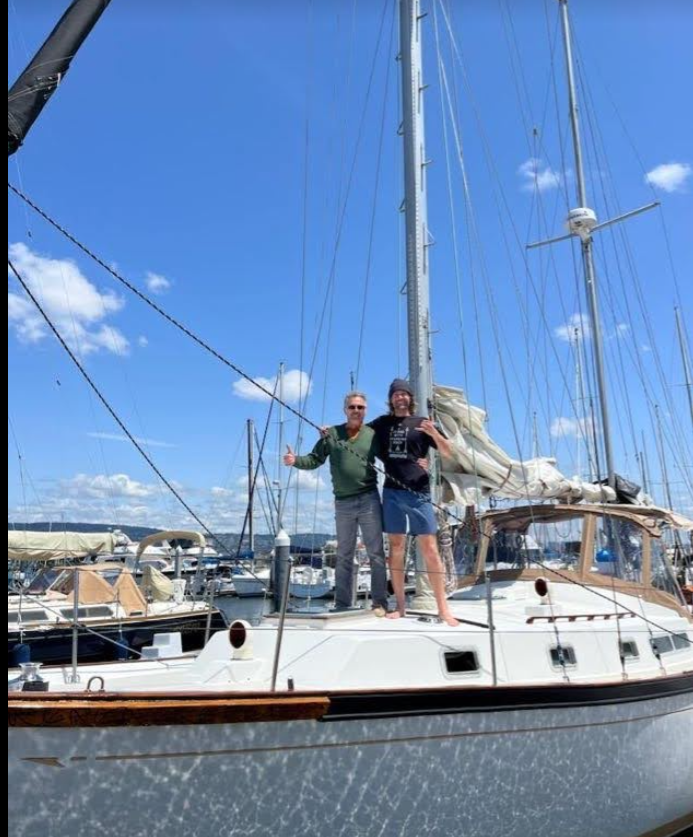

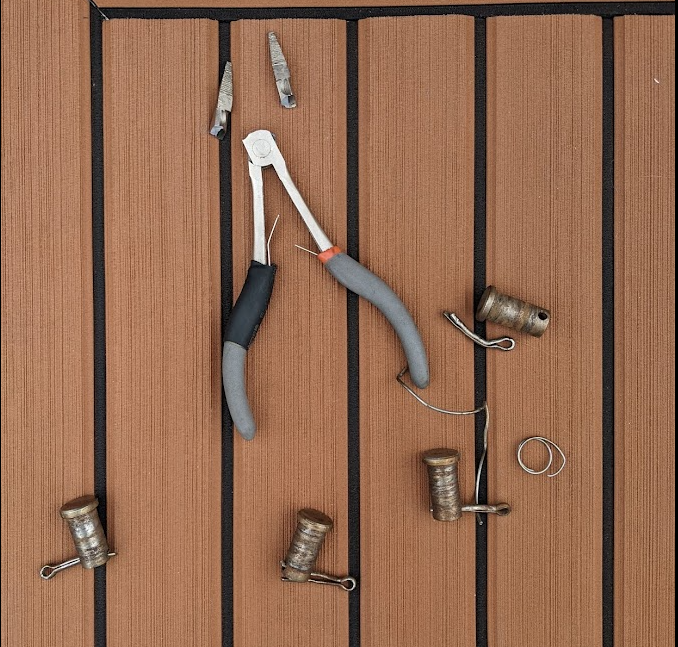
Great blog #1, Gavin! Brought back memories of going out of Ventura with your mom, dad, Morgan, & you.
Great writing monkey and excellent advice. Many of my friends are signing up to follow your blog (so they can be pirates vicariously !)